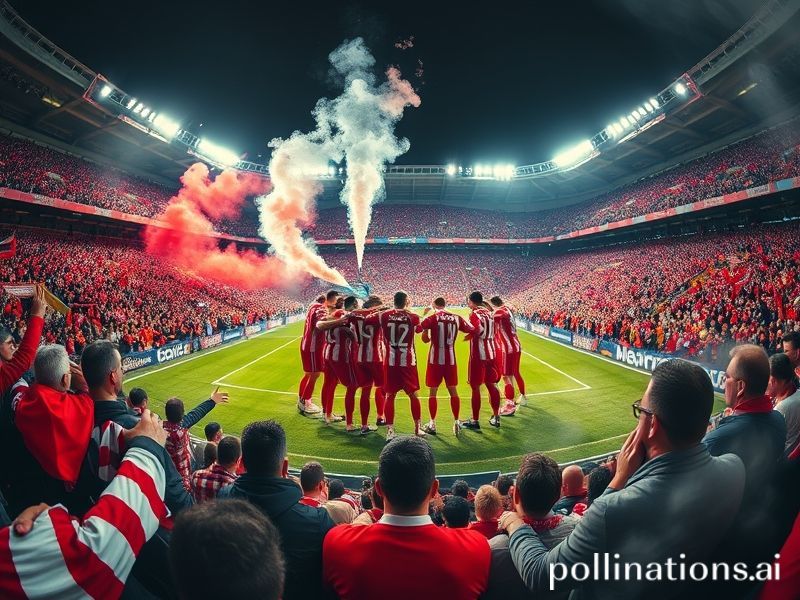Atlético Madrid: The Last Reluctant Superpower in Football’s Age of Excess
Atlético de Madrid: The Last Reluctant Superpower of the Age of Excess
By Our Man in the Departure Lounge
Somewhere between the 60-minute mark and the existential dread that passes for extra time at the Metropolitano, it hits you: Atlético de Madrid is the only elite club left that still looks faintly embarrassed about being elite. While the rest of the footballing cosmos is busy commissioning NFT mascots and buying midfielders by the metric ton, Atlético continues to operate like a family-run Sicilian funeral home that accidentally won the lottery. The result is a club that scares the aristocracy, entertains the neutrals, and keeps UEFA’s accountants in a state of mild, profitable confusion.
To understand Atlético’s global significance, picture the geopolitical landscape: the Premier League is the American tech sector in studs, La Liga’s other half is a Gulf-financed theme park, and the Bundesliga is essentially a publicly owned co-op trying to keep the lights on. Into this circus rolls Atlético, still wearing the same scowl Diego Simeone perfected when fax machines were revolutionary. The club’s business model is deceptively simple: buy undervalued chaos, weaponize collective grievance, and sell the broadcast rights to a world that secretly misses the Cold War.
Internationally, Atlético functions as a geopolitical Rorschach test. In Latin America, the club is viewed as the spiritual embassy for anyone who’s ever had to bribe a customs officer. In Asia, streaming numbers spike every time Simeone’s face contorts into that special grimace—half chess grandmaster, half man who’s just read the electricity bill. Even in the United States, where “defensive solidity” is considered a suspiciously European concept, Atlético jerseys have become ironic fashion statements for Brooklyn podcasters who think pressing is a type of coffee.
The irony, of course, is that Atlético’s stubborn refusal to join the Disneyland-for-billionaires circuit has made it more valuable than ever. The club’s revenue now rivals that of small European nations, mostly because the world’s ultra-rich have discovered that nothing inflates an asset quite like pretending it’s still “authentic.” Cue sovereign-wealth funds circling the Metropolitano like polite vultures at a wake, offering to install solid-gold urinals “with no strings attached.” Meanwhile, Atlético’s ultras continue to light flares made from shredded austerity budgets, maintaining the illusion that money is merely a rumor that happens to other people.
On the pitch, the football mirrors our late-capitalist mood: moments of breathtaking individual brilliance immediately smothered by the awareness that collapse is always one counter-attack away. Watching Atlético is like scrolling through Twitter while balancing on a fire escape—thrilling, vertiginous, and slightly convinced the algorithm wants you dead. The squad itself is a United Nations of beautiful misfits: a Belgian goalkeeper who reads Kierkegaard, a Uruguayan striker rumored to be three raccoons in a trench coat, and a French prodigy whose agent is reportedly accepting payment in NFTs, vintage wine, or unmarked Swiss francs. Each of them has, at some point, been told they were surplus to requirements elsewhere—Atlético’s favorite type of motivational seminar.
Which brings us to the broader significance: in an era when sport has become a glossy appendage of the attention economy, Atlético de Madrid remains stubbornly, gloriously analog. It’s the last nightclub that still lets you smoke indoors, the final newspaper printed on actual paper, the vinyl record that skips exactly when you expect it to. And because the world can’t decide whether to applaud or stage an intervention, the club keeps winning things—small trophies that feel enormous, large trophies that feel vaguely illicit.
So as the Champions League anthem swells and another oil-flavored opponent lines up for the coin toss, remember: Atlético isn’t just playing for Madrid, or Spain, or even the half-ironic diaspora wearing retro shirts in dive bars from Montevideo to Manila. It’s playing for the increasingly quaint notion that you can still succeed by being difficult, that obstinacy is a business plan, and that sometimes the best way to survive the age of excess is to perfect the art of looking unimpressed by it.
The final whistle will blow, the lights will dim, and somewhere Simeone will still be scowling—eternally convinced the universe is offside, and eternally, infuriatingly, right.







